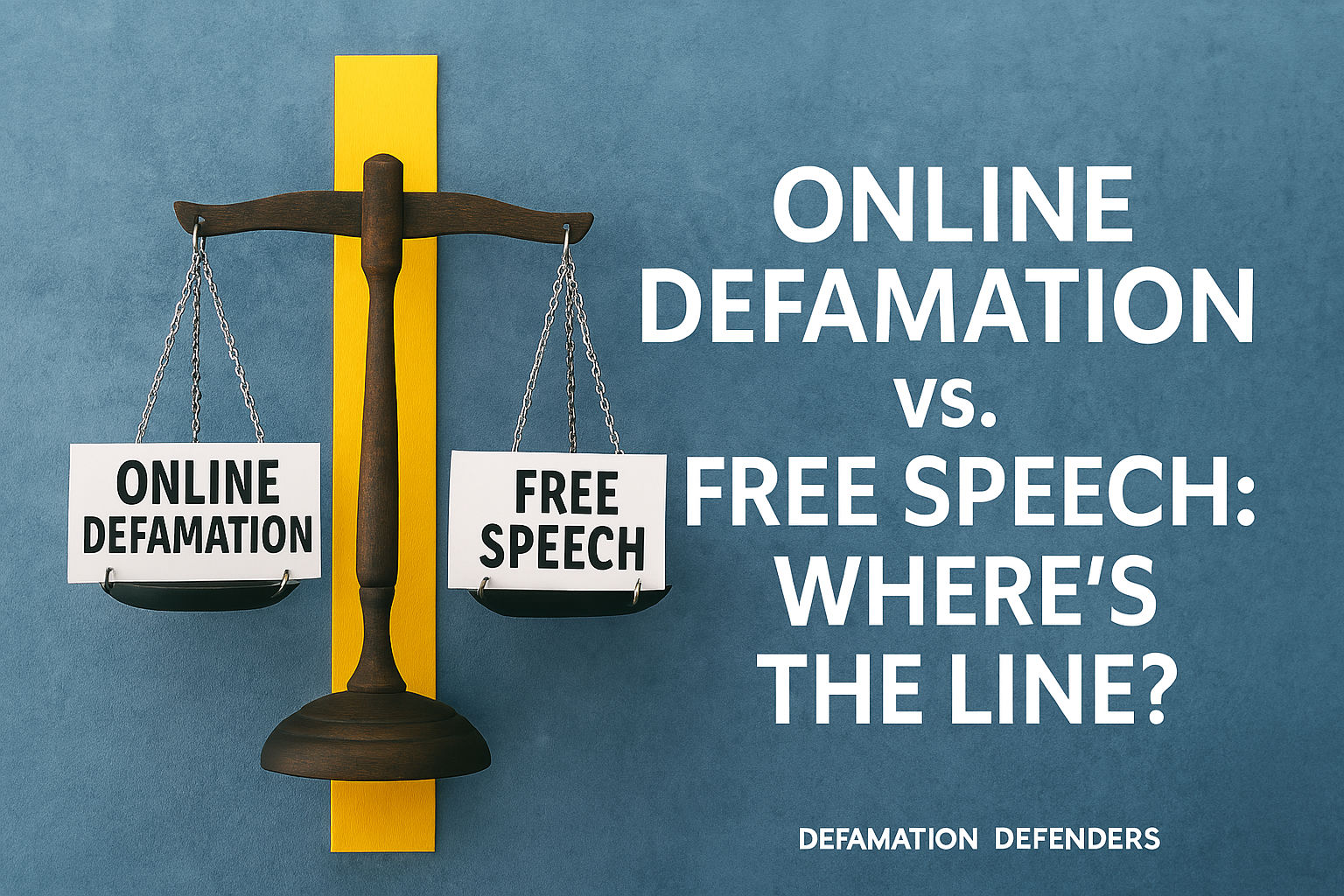Estimated reading time: 4 minutes
Table Of Content
Free Speech in the United States: The Basics
The First Amendment of the U.S. Constitution protects the right to express opinions, beliefs, and ideas—no matter how unpopular or controversial. But this right is not absolute.
Protected vs. Unprotected Speech
While most forms of speech are protected, certain categories fall outside First Amendment coverage:
- Defamation (libel and slander)
- True threats
- Obscenity
- Incitement to imminent lawless action
That’s where online defamation vs. free speech becomes a legal gray area.
What Is Online Defamation?
Online defamation occurs when someone publishes a false statement of fact about another person or entity that causes reputational harm.
Legal Elements of Defamation:
- A false statement of fact
- Publication to a third party
- Fault amounting to at least negligence
- Damages resulting from the statement
“You can express your opinion. But you can’t lie and call it the truth.” — Legal Information Institute
Statements such as “I think she’s rude” are protected opinion. Saying, “She embezzled money from her employer” (without evidence) is a false assertion of fact and can be legally actionable.
First Amendment and Defamation: What the Courts Say
The U.S. Supreme Court has ruled consistently that defamation is not protected under the First Amendment. This principle was clarified in the landmark case:
New York Times Co. v. Sullivan (1964)
This ruling introduced the “actual malice” standard for public officials. To win a defamation case, they must prove the statement was made:
- Knowingly false, or
- With reckless disregard for the truth
Gertz v. Robert Welch, Inc. (1974)
The Court expanded protections for private individuals, allowing them to win defamation cases by proving negligence rather than malice.
Source: Oyez – Supreme Court Case Summaries
Online Speech and Modern Defamation Challenges
Rise of Anonymous and Viral Content
Social media platforms have blurred accountability. Posts can go viral in minutes, causing massive reputational harm before facts are verified.
Common online defamation forms include:
- False accusations in tweets or Facebook posts
- Edited images or “deepfakes”
- Fake reviews on Google or Yelp
- YouTube videos spreading false narratives
Can You Be Sued for a Tweet?
Yes. Courts have upheld that content posted online—including tweets, comments, and memes—can constitute defamation if the legal criteria are met.
Examples of Speech Crossing the Line
| Type of Statement | Protected? | Why? |
|---|---|---|
| “In my opinion, he’s a terrible boss.” | Yes | Clearly stated as opinion |
| “He committed fraud and stole company money.” | No | A factual, damaging false statement |
| “She lied about her credentials.” | No | Harmful and verifiable claim |
| “I dislike her vibe.” | Yes | Subjective expression |
How to Protect Yourself Online
Think Before You Post
Before hitting publish:
- Ask: Is this true? Can I prove it?
- Avoid naming individuals or businesses unless necessary
- Clarify when you’re stating an opinion
Use Responsible Language
Wrong: “She is a scam artist.”
Better: “I had a bad experience with her services.”Victim of Online Defamation? What You Can Do
If someone falsely accuses you online:
- Document the post (screenshot, archive URL)
- Avoid engaging publicly
- Report the post to the platform
- Contact a defamation attorney
- Consider takedown options and reputation repair
Defamation Defenders: Your Ally in Online Reputation Defense
Defamation Defenders offers specialized support to:
- Identify and remove defamatory content
- Suppress harmful links using SEO strategies
- Draft cease and desist letters
- Coordinate legal referrals for litigation
- Rebuild your online presence
📞 Request a Confidential Case Review to defend your name today.
FAQ: Online Defamation vs Free Speech
No. Insults and opinions are protected. False factual claims are not.
Yes—if the lies are demonstrably false and cause real harm.
Using the word “allegedly” doesn’t offer automatic protection if the implication remains false and damaging.
No. Parody and satire are protected unless they are presented as factual.
Yes. Businesses can sue for false statements that harm their brand or revenue.
Related Content You Might Like:



